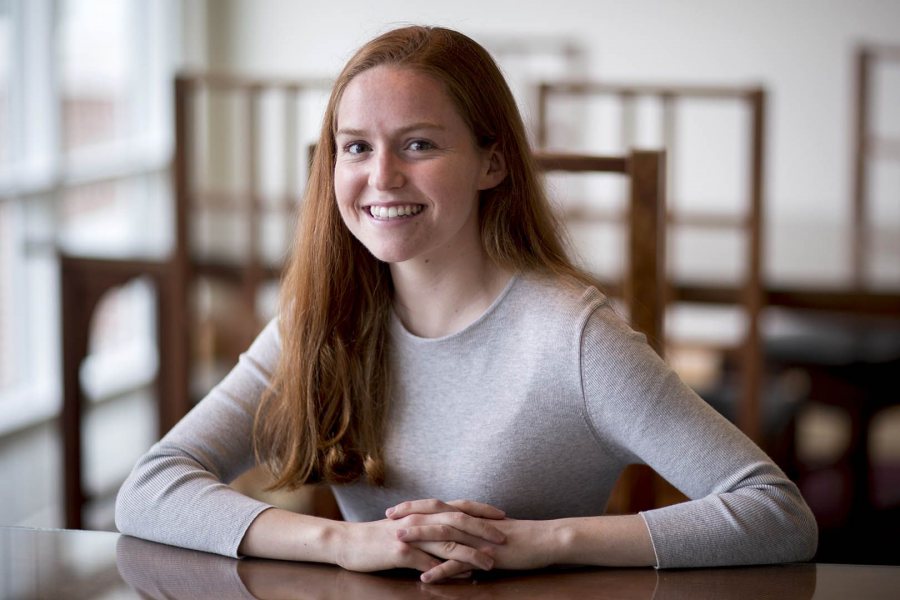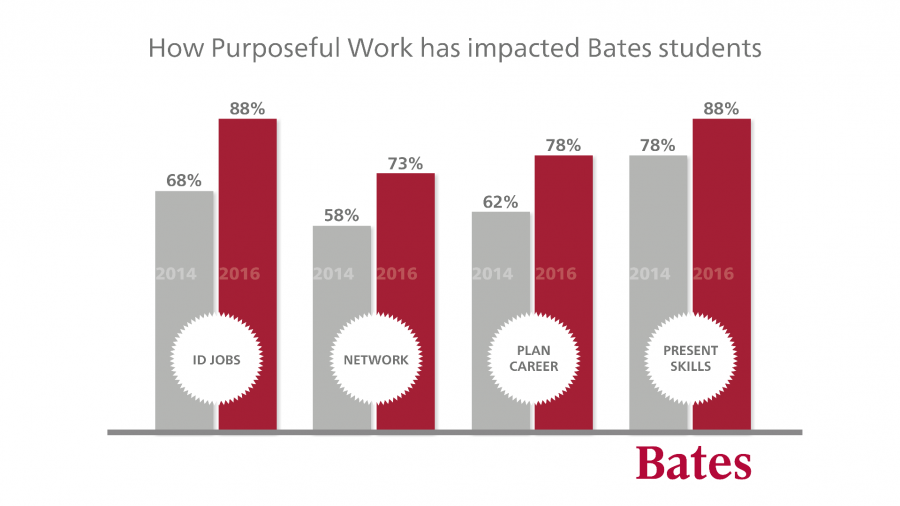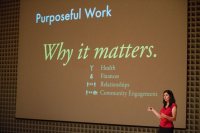
A happy life is the promised land of a liberal arts education. But since happiness and well-being are harder than ever to come by, no wonder that many colleges are doubling down on how best to prepare students to find post-graduation happiness.
Turns out that Bates might be doing a better job than the others. That’s one takeaway from a major feature story in Quartz about the college’s Purposeful Work program.
The brilliance of what’s happening at Bates under President Clayton Spencer, explains reporter Jenny Anderson, is that “Spencer comes at the happiness question from a slightly different angle.”

Through Purposeful Work, Callie Reynolds ’18 of West Hartford, Conn., was comforted to learn that pursuing a career interest is not a linear experience. (Phyllis Graber Jensen/ Bates College)
The Bates approach focuses on work. “If you get love and work right,” Spencer tells Anderson, paraphrasing Sigmund Freud, “you’ve sort of figured it all out.”
In other words, writes Anderson, Bates isn’t just trying to “teach kids how to be happy.” Instead, through Purposeful Work, Bates teaches students “how to figure out the work they want to do” in their work lives — a “key factor in creating happiness.”
Spencer tells Anderson that the “source of personal happiness and fulfillment has to be around meaning, and not the psychology of happiness. You find meaning by thinking and acting in the world in a way that aligns with your talents and interests and brings you joy, and makes a social contribution of some kind.”

Since the inception of the Purposeful Work initiative, Bates seniors’ confidence in their career-related abilities has increased significantly in all measures.
Anderson explains the program this way:
Students [at Bates] can take a psychology class about infancy and listen to guest lecturers, including doulas, nurse practitioners, stay-at-home dads, and brand-new moms, explain why the information in the class is relevant to what they do everyday.
During a five-week Short Term in May, Bates offers practitioner-taught courses: One digital marketing course was taught by a digital marketing consultant, while a dancer educated students on the business concerns involved in pursuing a career in the arts.
Students can also shadow workers in various fields for a day (many of them Bates alumni) and funding from the school is available for internships in fields that don’t pay, such as non-profits and the arts. Importantly, Purposeful Work seeks to give students who don’t have networks the skills and the experience to build them.
Among the college’s various Purposeful Work offerings and programs, is a course called “Life Architecture.” Taught by Bates psychologist Rebecca Fraser-Thill, one of the program architects for Purposeful Work, the course gives students the skills and self-knowledge they need make the best marriage of professional and personal fulfillment.
“I found it comforting that it will be a trial and error process.”
Part of that self-awareness is the face that career-building is hardly linear — a fact that shocks many students. Callie Reynolds ’18 is taking the course this Short Term. “I found it comforting that it will be a trial and error process,” she tells Anderson.
“I always thought you had to have a passion and great work would follow. I was awaiting that a-ha moment,” Reynolds said. But her experience at Bates showed her that “you have to try things out and create your passion — gain some career capital — and it might become your passion.”




